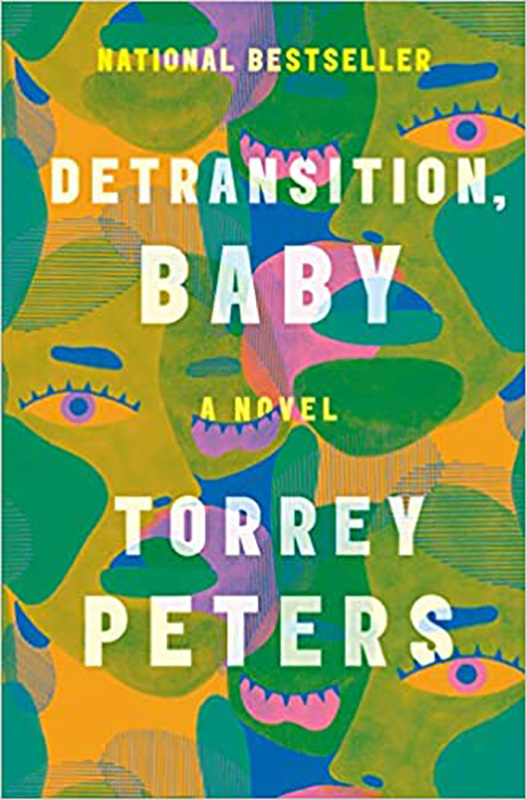It’s a rainy evening and you turn on the television to find your favorite sitcom. A small wave of comfort washes over you and you let that feeling settle you deeper into the couch. You know you’re safe here, cozy, with everything in place and as it should be.
Novelist Torrey Peters wanted to create this same kind of warm and intimate feeling but with trans characters at the center of the story, living their lives in a kind of Sex and the City familiarity. At the heart of her new book, Detransition, Baby, are three people — two of whom are trans and one of whom is cisgender — faced with an unintended pregnancy. They come together to see if their separate dreams can be braided into one family.
In the novel, trans women struggle with some relatable questions, like how to find meaning at work, how to make a home, how to be good friends and partners and how to look especially gorgeous when you know you might run into an ex.
Reese, a protagonist, lusts over a butcher block table, the kind of dining set she could settle down with.
“Oftentimes in the trans art that I’ve seen there’s an expectation that trans stories be in some way edgy or abject or gritty in the settings and themes and tones and that’s actually not the art that I enjoy,” Ms. Peters said. “I enjoy art that is sort of lush, that’s a little bit gossipy, that’s funny, that has a lot of humor and richness.”
Growing up in Chicago, Ms. Peters was a voracious reader, often reading several books per week. “I read a lot of genre stuff when I wanted to have fun and I read a lot of classics because that’s what was around,” she said.
It wasn’t until a college writing class that she realized how deeply she’d internalized the rhythms inherent in the novels she loved. And it’s these forms, these familiar modes of literature, that have influenced the work she does now.
“I think there’s an idea that trans stories have to be something new, that we’re going to invent a genre or a mode for trans stories and they’re going to be in between things or breaking binaries or something,” she said. “But then I think, well, I’m a trans person and that’s not what I grew up reading. That’s not my tradition.”
So Ms. Peters embraced the world she knew from the books she loved — and placed women like herself at center stage. In doing so, she reinvigorates the idea of a light-hearted, domestic novel of manners.
But there is also a fierceness and a revelatory honesty. The characters are astonishingly complex. What might be a cursory exchange in the hands of another writer instead brims with insight. The characters’ deepest desires flow forth in their every word. To get to this level of emotional honesty, Ms. Peters said she had to do the hardest kind of work.
“I wish I had a special insight on the world,” she said, but instead she had to get to her writing desk and “just be willing to sit and suffer.”
She forced herself to question everything she wrote. “I’d ask myself if it was true in a lot of different epistemologies,” she said. “Is it true in the words, is it true psychologically, is it true in terms of the larger motivations of these particular characters.”
Her characters’ motivations feel vividly real and Ms. Peters’ own authorial motivation to get them to that level was just as genuine. She had a very personal stake in their dilemmas.
“These were questions that felt like they were going to save my life. And I think that’s why I was willing to do it.”
Both Reese and Ms. Peters were having problems in their relationships with men, she explained. “If I didn’t solve these problems, not only would Reese continue to suffer but, at that time in my life, I would too.”
Another issue that Ms. Peters wanted to address was the pressure for trans women to appear “respectable,” because, Ms. Peters said, if trans women “were honest about wanting the same things everybody else wants, they would be labeled perverts or deviants.”
So she strove to write against that expectation, ”to not write the respectable thing, to write the honest thing.”
“That’s what I was trying to do,” she added. “To imagine into being a way for trans women to have satisfaction in a domestic space that I think has long been denied to them.”
At the end of the novel, there are no neat answers for her characters trying to make sense of love and family. But there is more to come. Ms. Peters is executive-producing and writing the pilot for a television adaptation of Detransition, Baby.
Torrey Peters takes part in a panel discussion Friday at the Martha’s Vineyard Museum with Sadeqa Johnson and Deesha Philyaw. The event begins at 2 p.m. and is moderated by Dawn Davis. She also participates in an author talk with Elizabeth Benedict on Saturday at the Chilmark Community Center. The talk begins at 12:15.








Comments
Comment policy »